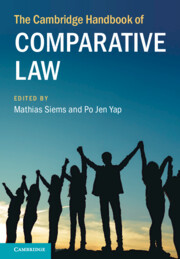Book contents
- The Cambridge Handbook of Comparative Law
- The Cambridge Handbook of Comparative Law
- Copyright page
- Contents
- Figures
- Tables
- Contributors
- Preface
- Abbreviations
- 1 Introduction
- Part I Methods of Comparative Law
- Part II Legal Families and Geographical Comparisons
- Part III Central Themes in Comparative Law
- 19 The Tradition of Comparative Law: Comparison and Its Colonial Legacies
- 20 Decolonial Theory and Comparative Law
- 21 Legal Transplants: A Theoretical Framework and a Case Study from Public Law
- 22 Legal Transplants: A Case Study of Private Law in Its Historical Context
- 23 Convergence and Divergence in Public Law
- 24 Convergence and Divergence in Company Law
- 25 Law and Development
- 26 Divided Legal Systems
- 27 Legal Pluralism and Commerce
- Part IV Comparative Law beyond the State
- Index
23 - Convergence and Divergence in Public Law
from Part III - Central Themes in Comparative Law
Published online by Cambridge University Press: 26 January 2024
- The Cambridge Handbook of Comparative Law
- The Cambridge Handbook of Comparative Law
- Copyright page
- Contents
- Figures
- Tables
- Contributors
- Preface
- Abbreviations
- 1 Introduction
- Part I Methods of Comparative Law
- Part II Legal Families and Geographical Comparisons
- Part III Central Themes in Comparative Law
- 19 The Tradition of Comparative Law: Comparison and Its Colonial Legacies
- 20 Decolonial Theory and Comparative Law
- 21 Legal Transplants: A Theoretical Framework and a Case Study from Public Law
- 22 Legal Transplants: A Case Study of Private Law in Its Historical Context
- 23 Convergence and Divergence in Public Law
- 24 Convergence and Divergence in Company Law
- 25 Law and Development
- 26 Divided Legal Systems
- 27 Legal Pluralism and Commerce
- Part IV Comparative Law beyond the State
- Index
Summary
With the advent of globalisation and the ubiquity of modern technology, the world has become increasingly interdependent, and a seamless transnational flow of commodities and capital is gradually erasing national boundaries. Constitutional ideas too are not immune from this globalizing force. Mark Tushnet has projected that constitutional systems all over the world will ‘inevitably’ converge ‘in their structures and in their protections of fundamental human rights’. There are multiple pathways to such constitutional convergence. The changes can arise exogenously, for example when new constitutions are imposed by foreign powers on domestic states, or when countries are coerced into accepting constitutional change in exchange for economic or military aid. Other constitutional changes can occur endogenously, for example the domestic legislature relies on foreign materials to amend its constitution, or domestic judges incorporate comparative legal materials when interpreting their local constitutions. This chapter focuses on Asian developments. Specially, it seeks to explain why Taiwan and South Korea – two liberal democracies – are converging with the West on constitutional jurisprudence, while authoritarian states like China and Singapore – deeply suspicious of Western values – remain outliers and have diverged from this cosmopolitan constitutional project.
Keywords
- Type
- Chapter
- Information
- The Cambridge Handbook of Comparative Law , pp. 475 - 489Publisher: Cambridge University PressPrint publication year: 2024

